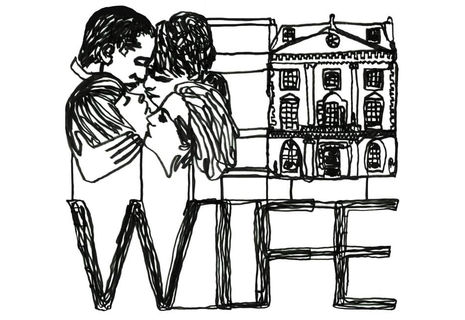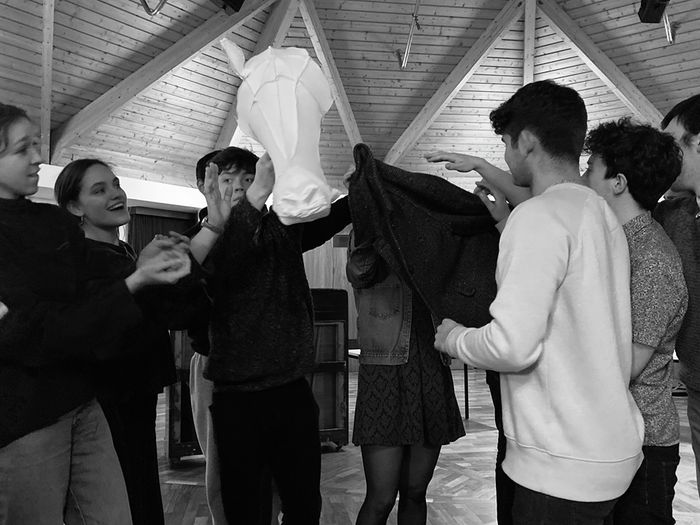Wife turns an Ibsen classic into a dazzling exploration of real human relationships
Marriage, past present and future, comes in all shapes and sizes. Iris Pearson finds much to relate to in this upbeat, exhilerating production of Wife.

Samuel Adamson’s Wife, first performed at the Kiln Theatre in 2019, is an examination of the institution of marriage through the lens of Ibsen’s Nora, the rebellious protagonist of A Doll’s House. The play travels from 1959 to 2042, exploring as it goes the complexities of homosexual and heterosexual marriage, and the price that we all pay for being ourselves. Nora’s story is performed over and over, interpreted and reinterpreted by the characters who find in it a truth about their own lives. Wife feels like it is constantly thinking and endlessly reworking, and Cara Dromgoole’s Cambridge production wonderfully captures this curiosity.
Dromgoole’s careful touch and keen eye for detail can be felt throughout this production. Her direction, supported by assistant directors Will Leckie and Jen White, makes the most of the slightly peculiar space of Pembroke New Cellars, choreographing with the diagonals and positioning the characters into corners of the stage to highlight their moments of conflict or cooperation, of coming together or growing apart. The transitions between scenes were pleasingly brisk: the dressing sequences as actors shifted from one part to the next were neatly executed and felt neither overworked nor gratuitous.
'McNamara’s talent is intelligent and perceptive; she never misses a beat.'
I was impressed by the neatness of this whole production. The costumes, designed and put together by Ellie Arden and Lydia Trail, are colour-coordinated and blushingly simple: they’re intriguing but fall short of ridiculous. Props are used sparingly but intelligently; Jamie Atkinson’s set complements the performances but never drowns them out, framing the scene but never defining it. The six actors are organised and confident in their performances, negotiating the play’s complexities and the wordiness of its script with subtlety and a sense of complete control over their material.
Aine McNamara in particular is fantastic. A rising star in Cambridge Theatre, this part played to the nuances of her acting talent and her ability to deliver long, emotionally weighted speeches without the rhythm becoming repetitive or the words mangled. McNamara’s Daisy is torn between her desires and her restrictive position as a daughter, wife and mother-to-be, teetering on the edge of complete rebellion and yet recognising the powerlessness of being a lesbian in 1950s London. McNamara’s talent is intelligent and perceptive; she never misses a beat.
'Neat yet eccentric, subtle yet confident, hilarious yet moving'
Theo Tompkins also deserves rapturous applause. Wife allows Tompkins to show off the full range of his talent, playing a booming patriarch before slipping seamlessly into a bawdy homosexual in a 1980s London pub, and then transforming himself once again into a naïve husband twisting himself into knots about gender and sexuality and the language that accompanies these conversations. Tompkins manages tonal shift in a way that simultaneously guides the audience through and whips the rug from under our feet; he delivers his lines with impeccable timing and the confidence of a professional.
Dromgoole’s production of this brilliant piece of new theatre is neat yet eccentric, subtle yet confident, hilarious yet moving – and teeming with questions. Wife doesn’t pretend to offer any answers, and Dromgoole, Leckie, White and their talented cast harness this uncertainty to create a compelling piece of theatre which leaves its audience impressed and inspired. ‘The world is always behind our Noras,’ the 1988 Norwegian actress tells us: watching Wife, it feels both dizzyingly impossible and incredibly important that we try to keep up.
 Features / Are you more yourself at Cambridge or away from it? 27 January 2026
Features / Are you more yourself at Cambridge or away from it? 27 January 2026 News / Vigil held for tenth anniversary of PhD student’s death28 January 2026
News / Vigil held for tenth anniversary of PhD student’s death28 January 2026 Interviews / Lord Leggatt on becoming a Supreme Court Justice21 January 2026
Interviews / Lord Leggatt on becoming a Supreme Court Justice21 January 2026 News / Reform candidate retracts claim of being Cambridge alum 26 January 2026
News / Reform candidate retracts claim of being Cambridge alum 26 January 2026 Comment / How Cambridge Made Me Lose My Faith26 January 2026
Comment / How Cambridge Made Me Lose My Faith26 January 2026










